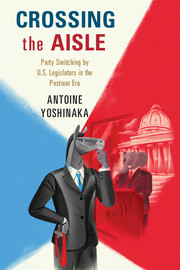Book contents
- Frontmatter
- Dedication
- Contents
- List of Tables
- List of Figures
- Acknowledgments
- PART I
- PART II
- PART III
- 5 The Electoral Consequences of Party Switching among Members of Congress
- 6 The Benefits of Party Switching: Intrainstitutional Advancement and the Committee Assignment Process
- PART IV
- Appendix A Excluded “Pseudo-Switchers”
- Appendix B Details about Elite Interviews
- Appendix C Data Sources for Chapter 3
- Appendix D Data Sources for Chapter 4
- Appendix E Data Sources for Chapter 5
- Appendix F Data Sources for Chapter 6
- References
- Index
6 - The Benefits of Party Switching: Intrainstitutional Advancement and the Committee Assignment Process
from PART III
Published online by Cambridge University Press: 05 December 2015
- Frontmatter
- Dedication
- Contents
- List of Tables
- List of Figures
- Acknowledgments
- PART I
- PART II
- PART III
- 5 The Electoral Consequences of Party Switching among Members of Congress
- 6 The Benefits of Party Switching: Intrainstitutional Advancement and the Committee Assignment Process
- PART IV
- Appendix A Excluded “Pseudo-Switchers”
- Appendix B Details about Elite Interviews
- Appendix C Data Sources for Chapter 3
- Appendix D Data Sources for Chapter 4
- Appendix E Data Sources for Chapter 5
- Appendix F Data Sources for Chapter 6
- References
- Index
Summary
The theoretical framework in this book emphasizes the primacy of political ambition in the decision to switch parties. In Chapter 3, I showed that ideological differences that impede access to powerful committees can prompt legislators to switch parties, which in turn opens up a path toward the fulfillment of intrainstitutional ambition. Before concluding that this finding is due to the causal mechanism posited by the theory, however, it is essential to show that the institutional trajectory of party switchers differs significantly from that of nonswitchers. If it is the case that members switch parties when their ambitions are thwarted, it must follow that those ambitions are realized after switching parties. On the other hand, the absence of such a pattern would cast serious doubt on the validity of a theoretical story whereby intrainstitutional ambition induces legislators to make a politically costly decision such as switching parties. From a theoretical standpoint, then, it is critical to take a closer look at the institutional ramifications of party switching. To tackle this question, I examine in this chapter the committee assignments of both party switchers and nonswitchers. I look at committee assignments, because as far as institutional currency in the U.S. Congress goes, committee assignments are highly valued as they help MCs achieve their various reelection, influence, and policy goals. It is my contention that the fate of switchers and nonswitchers in terms of their committee assignments informs our theoretical understanding of the motivation behind party switching.
My inquiry starts with the following questions: Are party switchers generally worse off, before the switch, than their nonswitching counterparts in terms of committee assignments? And are they treated favorably following their party switch? If the answer to both questions is “yes,” then this would provide support for the following propositions: (a) members who face an institutional cul-de-sac are likely candidates for switching parties; (b) party switchers are rewarded with valuable institutional currency, which translates into more influence; and (c) party switching requires party leaders to play an active role (since they have a disproportionate influence in the allocation of scarce resources such as committee seats).
Instances of favorable treatment afforded to party switchers in regard to committee assignments abound. For instance, during the 104th Congress, GOP leaders were able to ease Billy Tauzin's transition by letting him keep the seniority he had accrued as a Democrat.
- Type
- Chapter
- Information
- Crossing the AisleParty Switching by US Legislators in the Postwar Era, pp. 142 - 178Publisher: Cambridge University PressPrint publication year: 2015



